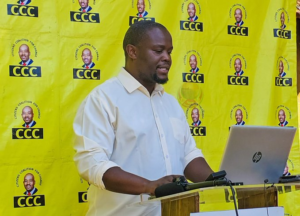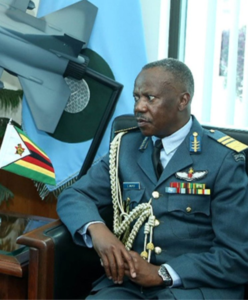ZIMBABWE’S POLITICAL TURMOIL: PRESIDENT MNANGAGWA SHUFFLES MILITARY LEADERSHIP IN A STRATEGIC POWER PLAY

In a surprising move that has sent shockwaves through the political and military establishment of Zimbabwe, President Emmerson Mnangagwa has orchestrated a significant reshuffle within the Air Force of Zimbabwe. In a bold act of political and military realignment following the recent elections, Air Marshal Elison Moyo, a pivotal figure in the November 2017 military coup that catapulted Mnangagwa to power, has been removed from his position as the commander of the Air Force of Zimbabwe. He is succeeded by Air Vice-Marshal John Jacob Nzvede, marking a new chapter in Zimbabwe’s complex power dynamics.
The removal of Moyo is a move fraught with implications, not only for the military’s hierarchy but also for the broader political landscape of Zimbabwe. This decision by President Mnangagwa is seen as a strategic maneuver, aimed at consolidating power and ensuring loyalty within the ranks of the military, which has been a significant player in Zimbabwe’s political arena for decades. The military’s role, especially in the context of the 2017 coup, underscores the delicate balance between military influence and political leadership in the country.
The appointment of Air Vice-Marshal John Jacob Nzvede is a clear indication of President Mnangagwa’s intent to realign the military’s leadership with individuals who are presumably more aligned with his vision and political strategy. This change at the top of the Air Force of Zimbabwe is emblematic of a broader strategy to secure and stabilize Mnangagwa’s reign in the face of growing challenges and uncertainties that lie ahead.
The implications of this reshuffle extend beyond the immediate changes in military leadership. It signals a significant shift in the power dynamics within Zimbabwe’s ruling establishment, suggesting that Mnangagwa is actively working to preempt potential threats to his authority. The removal of a key figure like Moyo, who was instrumental in Mnangagwa’s ascent to power, may also indicate a desire to move beyond the shadows of the 2017 coup and assert a new direction for the country’s leadership, free from the entanglements of past allegiances.
This reshuffle has raised numerous questions about the future of Zimbabwe’s political and military landscape. Analysts are keenly observing how these changes will affect the internal cohesion of the ruling ZANU-PF party and its relationship with the military. The military has been a kingmaker in Zimbabwean politics, and its support is crucial for any sitting president. Thus, ensuring the loyalty of the military’s top brass is a critical concern for Mnangagwa, especially as the country navigates through post-election tensions and the challenges of governance.
Furthermore, the impact of this reshuffle on Zimbabwe’s international relations and security policies will be closely monitored. The military plays a crucial role in shaping the country’s foreign policy and security stance. Changes in its leadership could herald shifts in Zimbabwe’s approach to regional and international engagements, affecting everything from diplomatic relations to security collaborations.
As Zimbabwe enters a new phase of power struggle and brinkmanship, the removal of Air Marshal Elison Moyo and the appointment of Air Vice-Marshal John Jacob Nzvede is more than a mere change of guard. It is a strategic move by President Mnangagwa to fortify his position, realign the country’s military leadership, and navigate the complex political currents that lie ahead. The significance of this reshuffle cannot be understated, as it will undoubtedly shape the contours of Zimbabwe’s political and military spheres for years to come. The nation watches with bated breath as these developments unfold, marking a pivotal moment in Zimbabwe’s ongoing quest for stability and governance amidst turmoil.




Changes in military leadership, when conducted judiciously, can enhance national security by addressing complacency and introducing new strategies to meet evolving threats. It’s an opportunity to reassess and strengthen the nation’s defense capabilities in line with current and future challenges.
The replacement of Air Marshal Elison Moyo with Air Vice-Marshal John Jacob Nzvede may signal a move towards ensuring strategic alignment with the President’s vision. However, it’s crucial that such alignments do not compromise the professional and operational integrity of the military. Leadership should be based on merit and the ability to uphold the nation’s defense and security, rather than personal loyalty to political figures.
This reshuffle underscores the ongoing influence of the military in Zimbabwe’s political sphere. While changes in military leadership are routine, the context of these changes particularly following an election raises questions about the delicate balance between civil and military relations in the country. Ensuring this balance is critical for the stability and integrity of democratic governance.
The removal of a high-ranking official who played a significant role in the 2017 coup highlights potential tensions within the military and the ruling party. Such reshuffles, while aimed at consolidating power, risk fracturing the unity within these institutions. It’s essential for Zimbabwe to foster a culture of loyalty based on institutional integrity rather than personal allegiances.
The lack of transparency surrounding the motivations and criteria for such significant reshuffles within the military can lead to speculation and uncertainty. Zimbabwe would benefit from a more open and accountable process in the appointment of military leadership, enhancing trust among the military ranks and the civilian population alike.